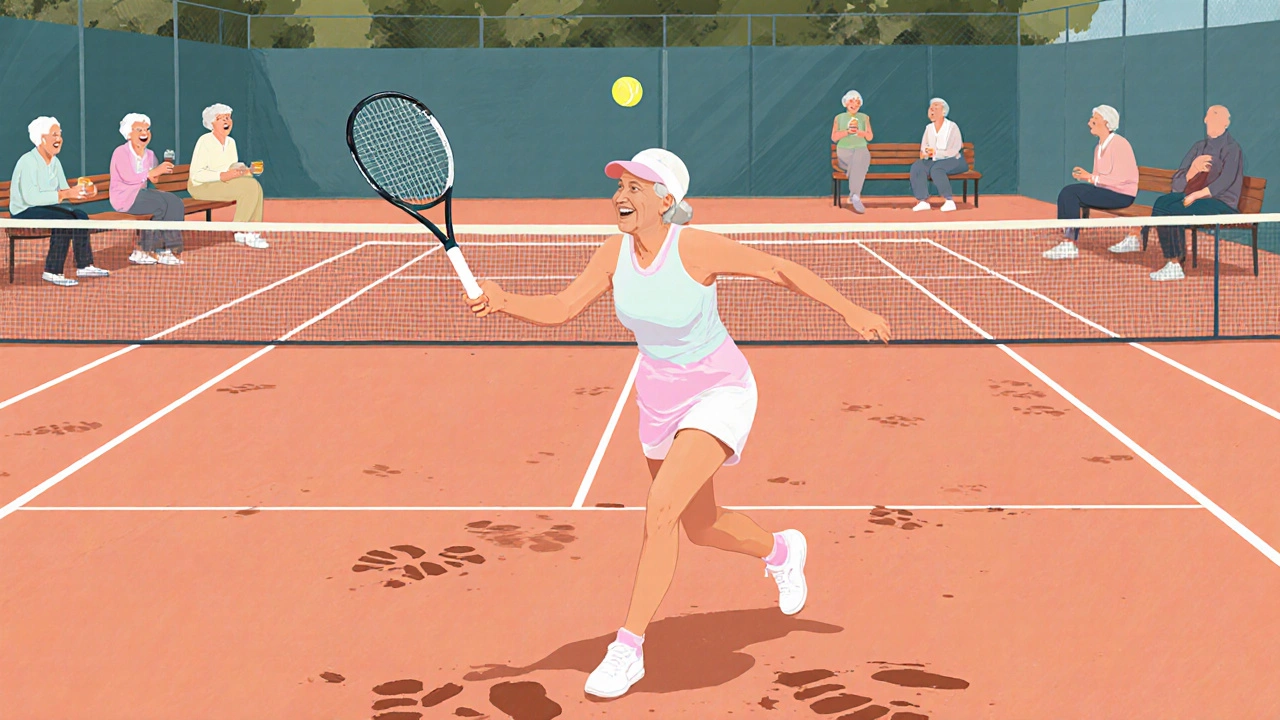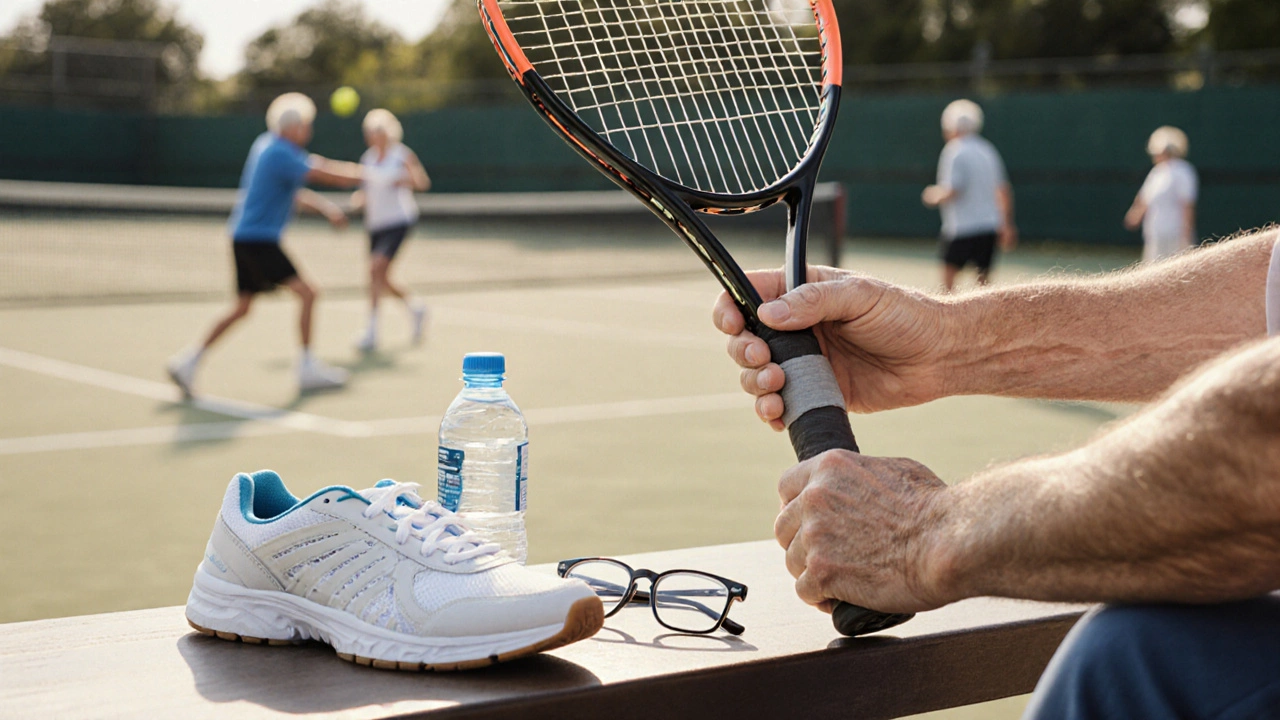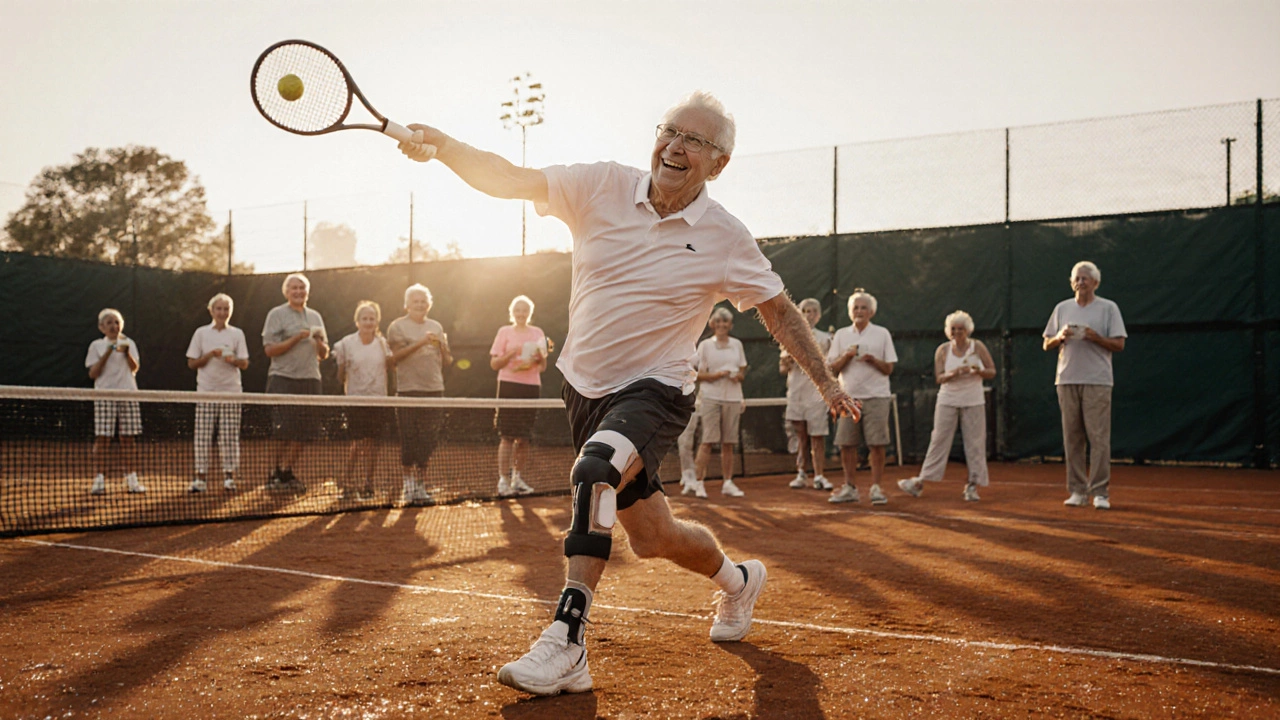Tennis Fitness Benefit Calculator
Calculate your potential fitness benefits and safe playing recommendations based on your age and tennis schedule. This tool uses data from the article to show you how tennis can improve your health as you age.
You see them on the courts at sunrise-granny glasses, knee braces, and still hitting winners down the line. One guy, 72, just won his local senior tournament. Another woman, 68, plays three times a week after retiring from her office job. So how old is too late for tennis? The short answer: there’s no real cutoff. But there are smart ways to start, and dangerous ones to ignore.
Tennis Doesn’t Care About Your Birth Certificate
Tennis is one of the few sports where age isn’t a barrier-it’s just a number. The USTA reports that over 1.2 million Americans over 55 played tennis in 2024. In Australia, Tennis Australia’s 2023 participation survey showed a 22% jump in players aged 60+ since 2019. These aren’t retired pros. These are people who picked up a racket for the first time in their 50s, 60s, even 70s.
Why does it work? Because tennis is low-impact compared to running or basketball. It’s stop-and-go. You don’t need to sprint 100 meters-you need to move smartly. You don’t need to be strong-you need to be balanced. And you don’t need to win-you just need to move, laugh, and hit the ball.
What Happens When You Start After 50?
Let’s say you’re 55, haven’t played since high school, and you’ve been sitting too long. Your first lesson might feel like a workout from hell. Your shoulders ache. Your knees creak. Your timing is off. That’s normal.
But here’s what changes in 6 months:
- Your balance improves-because you’re learning to shift weight on every shot.
- Your coordination gets sharper-hitting a moving ball forces your brain and body to talk to each other.
- Your heart gets stronger-tennis burns 400-600 calories an hour, depending on intensity.
- Your mood lifts-social play releases endorphins and reduces loneliness, which is huge for retirees.
A 2022 study in the Journal of Aging and Physical Activity tracked 147 adults over 60 who started tennis. After 12 weeks, their bone density increased by 3.8%, their reaction time improved by 19%, and 92% said they felt more confident in daily life.
When It Gets Risky-And How to Avoid It
Just because you can play doesn’t mean you should push through pain. The biggest mistake older players make? Trying to play like they did at 25.
Here’s what to watch for:
- Shoulder pain on serve-could mean rotator cuff strain. Switch to a lighter racket and use a continental grip to reduce stress.
- Knee swelling after matches-sign you’re overusing your joints. Try playing doubles instead of singles. Less running, more strategy.
- Lower back tightness-often from twisting without core strength. Do 10 minutes of planks and bird-dogs after playing.
Also, skip the hard courts if you have arthritis. Clay or acrylic surfaces are gentler. And never skip warm-ups. A 10-minute walk, leg swings, and arm circles cut injury risk by half.

The Right Gear Makes All the Difference
You don’t need the latest $300 racket. But you do need the right one.
For players over 50:
- Weight: 270-290 grams (lighter than pro rackets)
- Head size: 100-110 square inches (more forgiveness on off-center hits)
- String tension: 48-52 lbs (softer tension = more power, less shock)
- Shoes: Court-specific with good lateral support-no running shoes.
Brands like Wilson, Babolat, and Head all make senior-friendly models. Look for ones labeled “power” or “comfort.” Avoid “control” rackets-they’re for advanced players who can generate their own power.
Where to Play-And Who to Play With
Most clubs now offer “senior socials,” “beginner clinics,” or “no-competition play.” These aren’t tournaments. They’re just people hitting balls, laughing, and taking breaks for tea.
In Melbourne, places like the St Kilda Tennis Club and Box Hill Tennis Centre run weekly 60+ sessions. You don’t need to be good. You just need to show up.
Online platforms like TennisConnect (Australia-wide) let you find local players by age and skill level. You can filter for “beginner,” “casual,” or “social only.” No pressure. No rankings. Just play.

Real Stories: People Who Started Late
Meet Margaret, 67, from Geelong. She picked up a racket after her husband passed away. “I was lonely. I didn’t want to sit home and cry.” She joined a local group. Two years later, she’s playing in state senior championships. She didn’t win a title-but she won back her joy.
Then there’s Raj, 71, a former accountant from Sydney. He started at 65 after his doctor said he needed to move more. “I thought I’d be the oldest guy on the court. Turns out, I was the third-oldest.” He now plays doubles every Thursday and says tennis gave him more energy than his morning coffee.
These aren’t outliers. They’re the rule.
It’s Never Too Late-But It’s Never Too Early to Start Smart
If you’re 58 and thinking, “I’m too old,” you’re wrong. If you’re 70 and wondering if your knees will hold up, the answer is: maybe-but you can make them hold up.
The real question isn’t “How old is too late?” It’s “How badly do you want to move again?”
Tennis doesn’t demand speed. It rewards patience. It doesn’t require power-it rewards timing. And it gives back more than sweat: connection, purpose, and a reason to get up in the morning.
So grab a racket. Find a court. Call someone who plays. You don’t need to be young. You just need to show up.
Can someone over 70 still learn to play tennis?
Yes, absolutely. People over 70 regularly start tennis with proper guidance. The key is starting slow, using the right equipment, and focusing on fun over competition. Many senior centers and clubs offer beginner classes designed for older adults, with modified drills and shorter sessions. The body adapts at any age-just not as fast. Patience and consistency matter more than intensity.
Is tennis safe for people with arthritis?
Tennis can be safe with modifications. Avoid hard courts-opt for clay or acrylic surfaces. Use a lighter racket with lower string tension to reduce joint stress. Play doubles instead of singles to cut down on running. Warm up thoroughly and stretch after play. Many players with knee or shoulder arthritis find tennis helps maintain mobility better than swimming or walking alone, as long as they listen to their bodies and avoid pain.
Do I need to be fit to start tennis later in life?
No, you don’t need to be fit. In fact, tennis is one of the best ways to get fit if you’re starting late. Begin with 20-30 minute sessions twice a week. Focus on movement drills, light rallying, and footwork-not power. Over time, your stamina, balance, and strength will naturally improve. Many seniors start with a fitness coach or physiotherapist to build a base before hitting the court.
What’s the best way to find a tennis partner if I’m older and new?
Check with your local tennis club-they often have senior social groups or beginner clinics. Online, use TennisConnect (Australia) or the USTA’s Find a Partner tool. Facebook groups like “Tennis Over 50 Australia” are also active and welcoming. Don’t wait to be good-just show up. Most people in these groups are also beginners. The goal isn’t to win. It’s to play, laugh, and stay active together.
How often should I play tennis if I’m over 60?
Two to three times a week is ideal for most people over 60. Play 45-60 minutes per session. Include rest days to let joints recover. If you feel sore for more than 48 hours after playing, reduce intensity or frequency. Mixing tennis with walking or light strength training (like resistance bands) helps build overall fitness without overloading your body.
If you’re wondering whether it’s too late to start tennis, the answer isn’t in your age-it’s in your next step. Pick up the racket. Step onto the court. The game’s been waiting for you.
